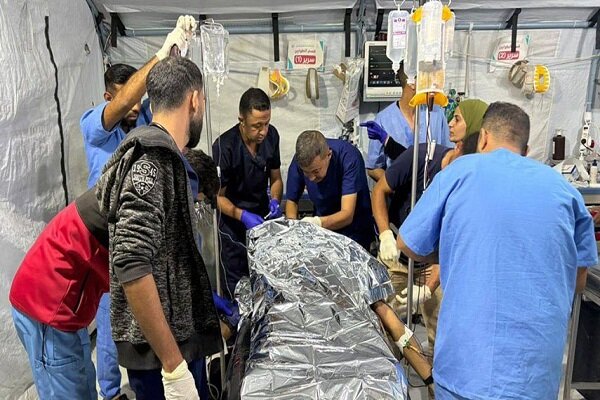Tragic Events in Gaza Reveal That International Laws Are Dead

webangah News Agency,International Desk: Anthony Hecker was born to a French father and an American mother with Lithuanian Jewish roots. Today, Hecker’s artistic vision is broad. His recent article titled “Global Psychological Crisis and a Call for Empathy” reflects his creative and intellectual journey. this time, he focuses on Palestine and the Gaza crisis, mapping suffering, silence, and propaganda across generations. Rejecting passive hope, he calls for ethical clarity, collective courage, and a revival of imaginative capacity to restore lost empathy.
Hecker invites us to understand how pain becomes a legacy, music embodies resistance, and how empathy’s absence may signal civilization’s tipping point. He challenges institutions and individuals alike: listen deeply, feel profoundly, act decisively. Below is the full text of Tehran Times’ interview with Anthony Hecker-French-american artist and member of the United Nations Writers Association:
What led you to focus your recent works on Gaza and Palestine? What personal, philosophical or ethical path brought you here?
I come from a French father and an American mother. My mother’s parents were Jews who emigrated from Lithuania to America. My grandfather escaped from the Red Army to America where he lived for several years until he could bring over his wife and children.
When my uncle turned 17 years old in France during World War II, he enlisted in the famous 101st Airborne Division known as “Screaming Eagles.” He was sent multiple times on missions targeting Nazi officers as a sniper operating solo. My father was part of the French resistance during World War II; Nazis arrested him at age 20 before sending him to Mauthausen forced labor camp. He survived because experienced political prisoners formed an internal resistance network that protected him.
These three brave men became role models for me. Growing up hearing their stories revealed what true courage means-the immense sacrifices made against oppression. Now I see America and Israel acting as oppressors against Palestinians while France-and much of Europe-supports them indirectly or explicitly. I cannot be complicit in violence inflicted repeatedly in my name: once as a Jew; again as an American; then as a Frenchman.
What sources shaped your understanding of Palestinian suffering? Have you encountered firsthand accounts?
I haven’t had direct contact with people in Gaza myself yet what shocks me most is Israel’s utter disregard for international law coupled with unconditional US support-and ultimately this absence called international law itself.
This absolute lack leaves Palestinians abandoned-forced daily over years into lives marked by cruelty and degradation. Regarding Gaza specifically: When voices are oppressed or distorted-what does reality even mean? Humans are complex beings molded through millions of years of evolution.
Amid conflicting narratives dominated by propaganda censoring dissenting voices-what meaning does seeking truth about Gaza hold?
The truth isn’t hunted down-it reveals itself naturally despite attempts or else. Western media have worked hard constructing narratives favorable only to Israel while censorship persists worldwide: people detained in England for speaking out; professors losing jobs in America; journalists targeted or forced resignations… But those orchestrating this distortion now step beyond limits-they cannot keep hiding facts anymore today when countless videos reveal Israeli army crimes openly online-even soldiers themselves film acts of brutality gleefully shared later online.
Such psychosis sows self-destruction seeds: claims like “Israel has right to self-defense” seem increasingly hollow every day.
You link empathy’s collapse with global silence toward Palestine-is this symptom proof deeper disorder exists?
Civilization builds upon humanity’s ability expanding its circle of empathy-from self-to family-to community-to country-to world at large-that expansion fuels our human strength.
Civilization depends on creative power-the force behind poetic expression.
Today efforts aim not just suppress but co-opt that power-a small group driven mad by fear and greed requiring endless wealth/power patch deep void caused by fundamental human disconnect.
Such psychological imbalance spreads contagious messages within society: “Greed is good,” “Think only yourself,” “Loot widely.” as long as such twisted definitions mark success-we shall never find peace.
Do you see signs among artists awakening sharply against Zionist regime crimes?
Certain voices emerge demanding truth transparency globally including prominent former US military officers speaking out loudly-not merely criticizing warlike leaders’ folly but challenging flawed values underpinning America Europe broader West too.
Increasing numbers protest Israeli actions alongside widespread Western backing peacefully which signals hope-but protest alone won’t change outcomes fundamentally.
Honestly I don’t believe hope holds real power anymore-I believe courage matters:
bold speech,
decisive action confronting madness tyranny directly.
And what about poets artists themselves? As a poet if all I do is social commentary I’ve failed.
Today’s world calls urgently not just for insight-but imagination-for describing why/how we fail doesn’t spur action alone anymore


